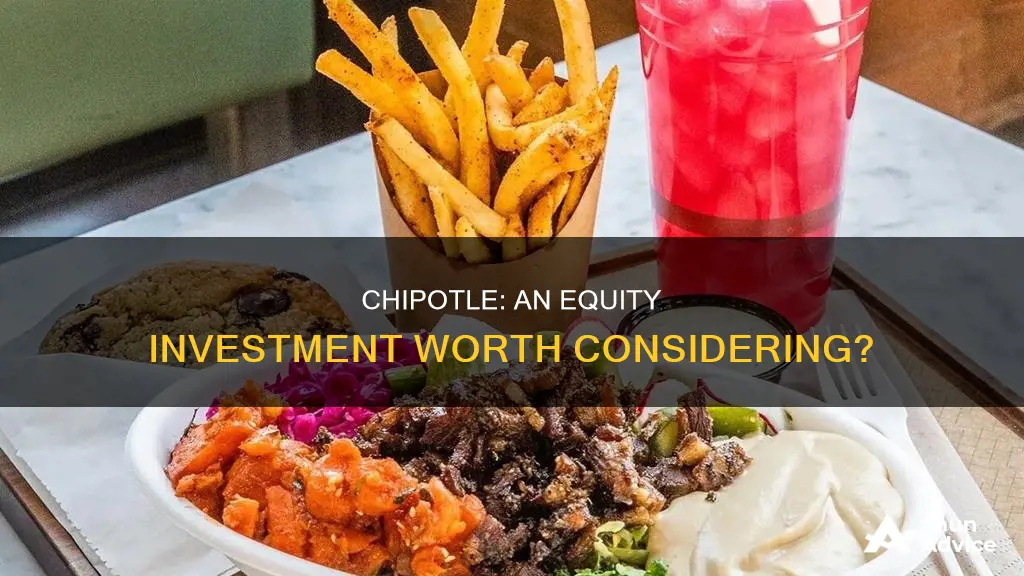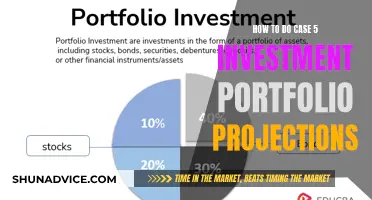
Chipotle Mexican Grill Inc. (CMG) is a fast-casual restaurant chain with over 3,300 locations across the US, Canada, the UK, France, and Germany. As of 2024, Chipotle's revenue was $9.9 billion, with a net income of $1.2 billion and a market cap of $81.3 billion. The company's business strategy includes running successful restaurants, attracting and retaining diverse talent, investing in restaurant technology and innovation, and improving access and convenience for customers. Chipotle has made venture capital investments in next-generation farming and supply chain technology, and its top shareholders include Montgomery Moran, Steve Ells, Vanguard Group, and BlackRock. With its strong brand and performance, Chipotle has a solid long-term trajectory, making it an attractive investment opportunity.
What You'll Learn

Chipotle's stock value and overvaluation
Chipotle Mexican Grill, Inc. (CMG) is a high-quality, moaty QSR company that has outperformed the S&P 500 over the past year with a 1Y total return of 65%. The company's stock value has seen a substantial increase, with a price-to-earnings ratio (P/E ratio) of 68 in December 2021, which has since dropped to 53x in April 2024.
Despite the impressive performance, some analysts argue that Chipotle's stock is overvalued. One reason for this is the company's ambitious expansion plans, which may be challenging to achieve. As of September 30, 2021, Chipotle operated 2,892 restaurants, and the leadership team believes there could be 6,000 locations in North America in the long term, and 7,000 including Europe. This would require opening new locations at an annual pace of approximately 300, which is more than ever before.
Another factor contributing to the perception of overvaluation is the high expectations for the company's performance. Chipotle's success against lofty investor expectations will require nearly flawless execution in various areas, including supply chain management, real estate sourcing, and entering new trade areas. The company's ability to meet these expectations will impact its stock value.
Additionally, Chipotle's stock split proposal, if approved by shareholders, will increase the number of shares and improve liquidity. However, this will not change the company's value, as the total dollar value of all shares outstanding will remain the same.
In summary, while Chipotle has demonstrated strong business performance and growth, there are concerns about the stock being overvalued due to aggressive expansion plans and high expectations. As of November 2024, Chipotle's stock was trading nearly 40% above Morningstar's fair value estimate, leading to a "sell" recommendation.
Savings, Investments, and the Economy's Vital Balance
You may want to see also

Top shareholders of Chipotle
As of 2024, Chipotle Mexican Grill Inc. (CMG) is a publicly-traded company with over 93% of its shares held by institutions. Here is a list of its top shareholders:
Top Individual Shareholders:
- Montgomery Moran: Former Co-Chief Executive Officer, President, and COO of Chipotle. He owned approximately 536,005 shares as of his latest SEC filing.
- Steve Ells: Founder and former CEO of Chipotle. As of his latest SEC filing in February 2020, he owned 231,363 shares, or 383,339 shares as of March 2018 per Chipotle's 2018 proxy document.
- Jack Hartung: Chief Financial and Administrative Officer and Chief Financial Officer of Chipotle. He is the third-largest individual shareholder with 67,166 shares according to an SEC filing dated February 16, 2024.
Top Institutional Shareholders:
- Vanguard Group: Held 2,707,233 shares of CMG as of December 30, 2023, representing 9.87% of shares outstanding.
- BlackRock Inc. (BLK): Held 2,034,459 shares of CMG as of December 30, 2023, accounting for 7.42% of all shares outstanding.
- JP Morgan Chase (JPM): Held 1,204,841 shares of CMG as of December 30, 2023, or 4.39% of outstanding shares.
Other notable institutional shareholders include Price (T.Rowe) Associates Inc, Capital World Investors, State Street Corporation, and Pershing Square Capital Management, L.P.
Portfolio Management: Broker's Investing Strategy for You?
You may want to see also

Venture capital investments in next-gen farming
Venture Capital Investment in Agtech
Agtech venture capital firms are investing in a wide range of technologies, including:
- Robotics and drones
- AI and machine learning
- Sustainable practices and food systems
- Supply chain management
- Biotechnology
- Precision agriculture
- Vertical farming
Leading Agtech Venture Capital Firms
Some of the leading venture capital firms investing in agtech include:
- S2G Ventures: Backed by the Walton family, S2G Ventures focuses on sustainable food production, aquaculture, and clean energy.
- AgFunder: Based in Silicon Valley, AgFunder is one of the world's most active agtech VCs, investing in companies such as BlueRiver, which was sold to John Deere for $305 million.
- Anterra Capital: This VC firm strongly focuses on food safety, security, and sustainability.
- Alumni Ventures Group: As the most active venture firm in the US as of 2022, Alumni Ventures Group has a vast network and invests in a diverse range of sectors, including agtech.
- Blackbird: With a portfolio worth over $7 billion, Blackbird has backed over 100 companies in Australia and New Zealand, including Canva and Zoox.
- Greater Colorado Venture Fund: This VC firm focuses on investments in rural areas outside the Colorado Front Range urban corridor, targeting seed-stage companies in various sectors, including agtech.
- Hanaco Venture Capital: Based in New York and Tel Aviv, Hanaco invests in seed to later-stage companies within the consumer products, services, and IT sectors, with a particular interest in Israeli companies.
- Hyperplane Venture Capital: Based in Boston, Hyperplane supports early-stage technology companies in areas such as machine intelligence, AI, and distributed systems.
- Impact Venture Capital: Based in Japan, Impact VC focuses on startups that aim to generate financial returns and positive social or environmental impacts, including in the agtech sector.
- Tekfen Ventures: As the venture capital arm of Tekfen Holding, Tekfen Ventures specializes in early-stage investments in sectors such as agriculture, construction, and manufacturing.
- Sony Innovation Fund: Operating as the venture capital arm of Sony Corporation, SIF invests in early-stage technology startups across various sectors, including agtech.
Corporate and Institutional Investment in Agtech
In addition to venture capital firms, corporations and institutions are also investing in agtech. For example, Chipotle Mexican Grill has a Cultivate Next venture fund, which makes early-stage investments in companies that align with Chipotle's mission to "Cultivate a Better World." Chipotle has invested in companies such as Local Line, a local food sourcing platform, and GreenField Robotics, which develops autonomous agricultural robots.
Furthermore, governments worldwide are heavily supporting agritech through subsidies and policies. For instance, the American Farm Bill and the European Common Agricultural Policy provide farmers with conservation grants and crop insurance, making high-tech, sustainable agriculture more accessible.
Investing in ADRs: A Guide for Indians
You may want to see also

Chipotle's business strategy
Running successful restaurants
Chipotle's restaurants are designed to deliver an excellent guest experience with great hospitality and real food cooked to perfection. The company has also put a strong emphasis on food integrity, ensuring that its food is responsibly sourced, classically cooked, and made from real ingredients.
Attracting and retaining diverse talent
Chipotle has committed to building an organisation with top-tier talent. They have also focused on retaining their talent by offering benefits such as increased average hourly wages.
Making the brand visible, relevant, and loved
Chipotle has invested in marketing and advertising to increase brand visibility and engagement. They have also focused on cultural relevance and loyalty by telling stories about their ingredients and employees across various media touchpoints.
Investing heavily in restaurant tech and innovation
The company has embraced digital transformation, introducing an "order on mobile/pick-up in-store" model years before their competition. They have also invested in their digital capabilities, such as launching a loyalty program and improving order accuracy.
Improving access and convenience for customers
Chipotle has expanded access and convenience by accelerating new restaurant openings and testing alternate formats, such as seam locations, to expand their addressable market. They have also improved convenience through the introduction of Chipotlanes, alternative formats, delivery, and catering.
CDs: Investment or Saving?
You may want to see also

Chipotle's long-term growth drivers
Expansion Plans
Chipotle has ambitious expansion plans, aiming to double its number of restaurants to 7,000. In 2022, the company opened 236 new restaurants, with 100 of these including a "Chipotlane" feature, a drive-thru lane that allows customers to place orders via the company's mobile app. In 2023, management plans to open 250 or more restaurants, and this rapid expansion is expected to contribute to the company's growth over the next five years.
Strong Financial Performance
Chipotle has demonstrated strong financial performance, with increasing revenues, earnings, and net income. In FY2022, revenues increased by 14.4%, and comparable restaurant sales rose by 8%. The company's diluted EPS for the full year was nearly 40% above the reported EPS for FY2021. In 2023, Chipotle reported a 36.7% increase in net income compared to the previous year.
Innovative Service Models
Chipotle has successfully tapped into the Millennial market and has a loyal customer base. The company's focus on convenience and innovation, such as the Chipotlane feature and investments in restaurant technology, have contributed to its growth. Digital sales accounted for 39.4% of the company's total revenue in 2022, and the company's loyalty program, accelerated during the pandemic, is expected to drive increased order frequency and reduce customer churn.
Commitment to Responsibly Sourced Ingredients
Chipotle's commitment to serving responsibly sourced, fresh, and safe food has been a key differentiator. Despite facing criticism and food safety issues in the past, the company continues to prioritize serving food "with integrity." This focus on responsible sourcing and food safety has helped Chipotle regain customer trust and is expected to remain a key driver of its long-term growth.
Savings or Investing: Which Offers Better Liquidity?
You may want to see also
Frequently asked questions
Chipotle Mexican Grill Inc. (CMG) is the largest fast-casual restaurant in the US. It was founded in 1993 in Denver by its first CEO, Steve Ells. As of 2024, it has over 3,300 restaurants in the US and is present in Canada, the UK, France, and Germany.
While Chipotle is a great company with a loyal customer base and a wide economic moat, some analysts believe that its stock is overvalued and should be avoided. However, others believe that it is a "Strong Buy" below 35x, a "Buy" at 40x, and a "Hold" above.
Chipotle's business strategy is based on five pillars: running successful restaurants, attracting and retaining diverse talent, making the brand visible and loved, investing in restaurant technology and innovation, and improving access and convenience for customers.
Chipotle's long-term growth is driven by store expansion, comparable sales growth, and operational excellence. They are targeting 7,000 locations and $4 million in per-restaurant sales.







